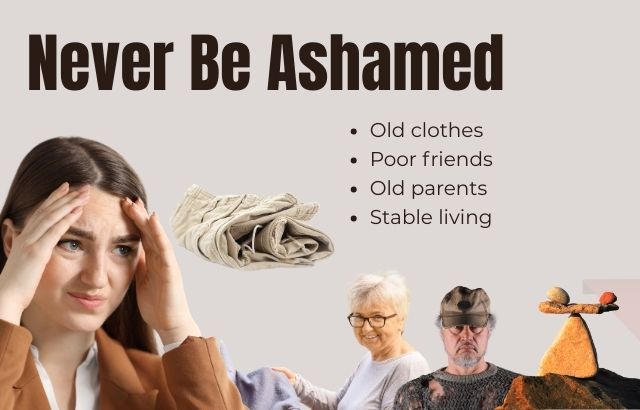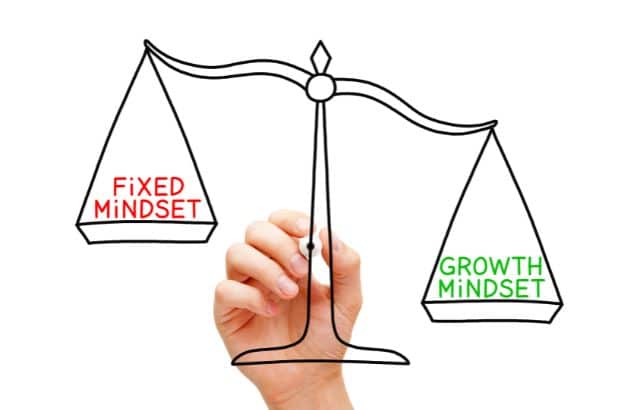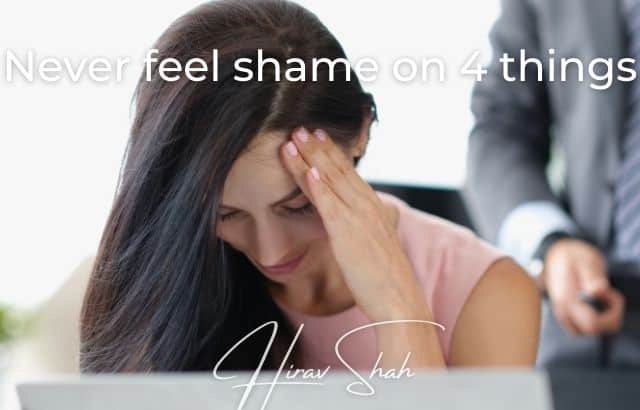In today’s image-driven world, society often rewards appearance over authenticity.
Expensive clothes, luxury cars, foreign trips, and picture-perfect social media posts have become symbols of success.
But here’s the reality: in chasing these symbols, many people hide the very things that truly define strength, character, and wisdom.
Table of Contents
Section 1 – What This Article is About
This article is about four things you should never feel ashamed of:
- Old clothes
- Poor friends
- Old parents
- Stable living
These are not flaws to hide — they are assets that shape your mindset, your strategy, and ultimately, your success in life and business.
Unfortunately, most people shy away from showing them because of two powerful forces: fear and social judgment.
When you allow these forces to control you, you start making choices to impress others instead of making decisions that serve your real goals. In business, this can mean wasted resources, wrong priorities, and a constant feeling of chasing validation instead of creating value.
“If you are ashamed of your roots, you will always overcompensate in business — leading to bad decisions and wasted energy.” – Hirav Shah | Business Strategist
In the sections ahead, we’ll first understand the psychology behind why we hide these truths — starting with fear.
Section 2 – What is Fear?
Fear is one of the most natural human emotions.
At its core, fear is designed to protect us — to stop us from touching fire, walking into danger, or taking risks that could harm us physically.
But in modern life, the majority of our fears are imaginary.
We no longer run from predators. Instead, we run from opinions.
We fear criticism. We fear being misunderstood. We fear not looking “successful enough” in front of others.
And because of this, we often avoid showing the most genuine parts of our life.
In business, fear shows up in different ways:
- A founder delays launching a product because they fear it won’t be perfect.
- An entrepreneur avoids asking for investment because they fear rejection.
- A leader avoids changing their business model because they fear being judged for making a wrong call.
The problem is that this type of fear is not protective — it’s paralyzing.
It blocks progress before it even starts.
It stops bold, right decisions before they have a chance to prove their value.
Here’s the truth: fear will never completely disappear.
The key is not to eliminate fear but to manage it — to take control before it controls you.
“Fear is a prison where the key is in your own hands.” – Hirav Shah, Author of 19+ Strategy Books
The most successful entrepreneurs, leaders, and changemakers are not fearless — they are simply experts at acting in spite of fear.
Section 3 – What is Social Judgment?
Social judgment is the invisible scoreboard society uses to measure a person’s worth.
It’s the subtle — and sometimes loud — way people decide whether you are “successful” based on what they see, not who you are.
Society often values:
- The brand of your clothes
- The size of your house
- The car you drive
- The circles you socialize in
But here’s the catch — these are surface-level measures. They say nothing about your integrity, wisdom, resilience, or character.
This is why so many people feel pressured to keep upgrading their image, even if it means sacrificing financial stability or peace of mind.
In business, this judgment can push you toward wrong decisions:
- Launching products that look trendy but lack long-term demand
- Spending heavily on office interiors for “image” instead of investing in talent or technology
- Chasing PR over product quality
“The world judges your cover before it reads your story — but your real success is written inside.” – Hirav Shah, Global Business Advisor
When you let social judgment dictate your moves, you end up playing someone else’s game instead of building your own.
Section 4 – What is Fear of Social Judgment?

Now, let’s combine the two forces: fear and social judgment.
Fear tells you, “If you don’t meet the standards of society, you will lose respect.”
Social judgment reinforces that fear by constantly reminding you that you’re being watched and compared.
This combination is dangerous — it creates insecurity.
And insecurity is expensive. It makes you:
- Overspend to look “successful”
- Hide your real friends or lifestyle because they don’t fit the image
- Avoid authenticity in personal branding
- Chase trends instead of building timeless value
In business, the fear of social judgment is why companies:
- Spend millions on image-building but fail to invest in core operations
- Keep unprofitable ventures alive just to maintain status
- Avoid necessary pivots because “what will people say?”
“The moment you start running your business for applause instead of results, you start losing both.” – Hirav Shah | Business Strategist
Breaking free from this fear means accepting that judgment will never stop — but it doesn’t have to stop you.
When you choose values over validation, you gain clarity, confidence, and the freedom to make decisions that truly serve your goals.
Section 5 – What is Mindset?
Mindset is the filter through which you see the world.
Two people can face the same situation — one sees it as an opportunity, the other as a problem — simply because their mindsets are different.
There are generally two types:
- Growth Mindset – Believes skills can be developed, challenges are opportunities, and learning never stops.
- Fear-Driven Fixed Mindset – Avoids risks, resists change, and makes decisions to stay comfortable rather than to grow.
In life and business, mindset is often more important than talent.
A growth mindset pushes you to take calculated risks, adapt to change, and focus on long-term wins instead of short-term applause.
A fear-driven mindset, on the other hand, keeps you stuck — always wondering “what will people say” instead of asking “what’s the right move?”
“Your mindset is the CEO of your life — it decides whether you run your day or your day runs you.” – Hirav Shah, Author of 19+ Strategy Books
Strong businesses are built by leaders who can manage both their skill set and their mindset.
Section 6 – Never Feel Shame About These 4 Things: The Intro
Now that we’ve unpacked fear, social judgment, and mindset, it’s time to talk about the four things you should never feel ashamed of:
- Old Clothes
- Poor Friends
- Old Parents
- Stable Living
These are not just personal choices — they are reflections of your values.
They shape how you think, how you lead, and how you make decisions.
They are not signs of poverty, weakness, or lack of ambition — they are signs of authenticity, loyalty, and strategic wisdom.
In life, being proud of these things means you live with integrity.
In business, it means you operate with clarity, resist unnecessary pressures, and build long-term trust with people who matter.
“In personality, simplicity. In life, stability. These are the foundations of the strongest brands.” – Hirav Shah | Business Strategist
Let’s start with the first one — and see why it’s not just about clothes, but about the way you approach resources and decisions.
Part 1 – Old Clothes: Resourcefulness Over Show-Off

Story:
A successful entrepreneur is spotted wearing the same shirt he wore five years ago.
Some people laugh, others wonder why. His answer? “It’s comfortable, it’s neat, and I don’t spend money just to impress people.”
Mindset:
Choosing old clothes is not about being cheap — it’s about valuing resources over image.
It means you understand that your worth is not defined by labels or trends.
Business Link:
Leaders who manage their personal spending with discipline often run their businesses with the same discipline.
They resist the urge to burn cash for short-term image boosts and instead focus on investments that create long-term value.
Outcome:
- Better financial control
- A brand image of humility and groundedness
- Increased trust from investors, partners, and employees
“Clothes can fade, but the mindset behind them can build empires.” – Hirav Shah, Global Business Advisor
Part 2 – Poor Friends: Loyalty Builds Stronger Networks
Story:
A startup founder, on the verge of a major decision, doesn’t call a high-profile consultant.
Instead, he calls his childhood friend who has never run a business but knows him inside out.
That honest, no-agenda feedback helps him avoid a costly mistake.
Mindset:
True friends don’t measure your worth by your bank balance.
They bring honesty, loyalty, and reality checks — things money can’t buy.
Keeping them close is not about charity; it’s about keeping your life anchored in truth.
Business Link:
In business, the most valuable network isn’t always the richest — it’s the most reliable.
The people who stand with you in tough times are the same people who will keep you grounded when success comes.
Outcome:
- Access to unfiltered, honest advice
- Emotional stability in high-pressure situations
- Reduced risk of overconfidence or ego-driven mistakes
“Friendship measured in money is not friendship — it’s just a transaction.” – Hirav Shah, Author of 19+ Strategy Books
Part 3 – Caring of Old Parents: Appreciating the wisdom and love of older parents

Story:
A CEO is about to sign a risky international partnership deal.
Before finalizing, he spends an evening discussing it with his 78-year-old father.
The advice is simple: “Opportunities are like trains; another one will come. Don’t rush.”
That patience saves the company from a disastrous deal.
Mindset:
Respecting and valuing the experience of your parents is not about being “traditional” — it’s about recognizing that wisdom is often earned through decades of trial and error.
Business Link:
In business, quick wins can be tempting, but sustainable success often comes from long-term thinking.
Elders bring perspective, help you avoid repeating mistakes, and teach you to play the long game.
Outcome:
- Better decision-making through patience
- Increased trust from teams and investors
- Strategic advantage in competitive markets
“Parents don’t just give you life — they give you the reason to live it well.” – Hirav Shah | Business Strategist
Part 4 – Stable Living: The Silent Competitive Advantage

Story:
An entrepreneur refuses to relocate every two years just for the sake of appearing “elite.”
Instead, he builds deep local relationships, develops a loyal customer base, and creates a business model rooted in stability.
Mindset:
Stability isn’t boring — it’s a form of strength.
It reflects confidence in your direction, consistency in your actions, and clarity in your long-term plan.
Business Link:
In life, stable living brings peace.
In business, stability in your model brings predictable revenue, reduced risks, and more room for innovation.
Outcome:
- Steady cash flow
- Loyal customer base
- Reduced operational stress and uncertainty
“In a noisy world, stability is the sweetest sound of success.” – Hirav Shah, Global Business Advisor
Breaking free from societal expectations and norms

As we embrace and celebrate our own individuality, it’s important to empower and support others in their journey as well. We all have different paths, experiences, and choices that shape who we are. By embracing old clothes, poor friends, old parents, and stable living, we can create a more inclusive and compassionate society.
Let go of judgment and comparison, and instead, celebrate the diversity of experiences and perspectives that make us human. Support others in their choices, be a listening ear, and offer kindness and understanding. By doing so, we not only uplift others but also create a world where everyone feels seen, valued, and accepted.
Empowering and supporting others in their journey

In a world that often shames us for our choices, it’s important to remember that true happiness comes from within, not from the material possessions or opinions of others. Embrace your old clothes, cherish your poor friends, value your aging parents, and find contentment in your stable living situation. These aspects of your life are not sources of shame or embarrassment; they are opportunities for personal growth, meaningful connections, and valuable life experiences.
So let go of society’s judgment, break free from its expectations, and live authentically and confidently. Celebrate your individuality, empower others, and create a world where everyone is free to be their true selves. Remember, you have the power to define your own worth and live a life that is truly fulfilling.
Final Wrap-Up – The Four Pillars of Authentic Success
Old clothes, poor friends, old parents, and stable living — these four may not make headlines on Instagram, but they are the foundation of a life and business worth building.
Each of them represents a value far greater than money:
- Old clothes → Resourcefulness and discipline
- Poor friends → Loyalty and trust
- Old parents → Wisdom and long-term thinking
- Stable living → Consistency and security
When you embrace them instead of hiding them, you don’t just protect your peace — you sharpen your decision-making, strengthen your network, and build a brand of integrity that people respect.
“Life and business are not about showing more — they’re about being more.” – Hirav Shah, Author of 19+ Strategy Books
Strategic Takeaway – Values That Build Unshakable Brands
In leadership, these four traits translate directly into business advantage:
- Financial Wisdom – Managing resources smartly
- Loyalty – Building reliable, long-term relationships
- Wisdom – Making decisions with perspective, not panic
- Stability – Creating structures that can withstand market shocks
If you embrace these values, your personal brand and your business will reflect authenticity instead of artificial glamour. And in the long run, authenticity always wins.
Call to Action – Audit Your Life & Business
Take a moment today to reflect:
- Are you overspending just to maintain an image?
- Are you keeping your real, loyal friends close?
- Are you actively learning from the wisdom of your parents or elders?
- Is your business model built for stability, or are you just chasing trends?
“In life and business, if there’s one thing worth taking pride in, it’s your reality — not your show.” – Hirav Shah | Business Strategist
Live it. Lead it. And never feel ashamed of the things that truly make you strong.
FAQs – Never Feel Ashamed of These 4 Things
- Why is wearing old clothes seen as a strength in this article?
Because it reflects resourcefulness and financial discipline. In business, leaders who avoid unnecessary personal expenses often manage company budgets more wisely. - How can poor friends impact my business life?
True friends offer honest feedback and loyalty without hidden agendas. This helps you make grounded decisions and avoid the echo chamber of people who only tell you what you want to hear. - Why are old parents considered a business advantage?
Parents and elders bring wisdom from experience. Their long-term perspective helps you make better strategic decisions, avoid impulsive moves, and see opportunities more clearly. - How does stable living give a competitive edge?
Stable living creates mental peace and consistency. In business, this translates to stable revenue models, long-term customer relationships, and reduced operational chaos. - Isn’t it important to maintain a good public image for business?
Yes, but not at the cost of authenticity. Artificial image-building may bring short-term attention but rarely creates lasting trust. True branding comes from values, not vanity. - How do fear and social judgment affect my personal and business growth?
Fear and social judgment push you toward validation-seeking behaviors — overspending, hiding your real values, or chasing trends — which often derail your long-term vision and profitability. - What’s the main takeaway from this article?
Don’t hide values that reflect discipline, loyalty, wisdom, and stability. They are not weaknesses — they are strategic strengths in life and business.
Conclusion:
In a world driven by external validation, it’s crucial to remember that true success is not measured by material possessions, social circles, or fleeting trends. Embrace your journey, regardless of the clothes you wear, the friends by your side, the age of your parents, or the pace of your life. These elements shape who you are, and there’s no shame in staying grounded and true to yourself. In fact, they often hold the keys to personal strength, resilience, and the deep, unwavering values that define a fulfilling life.
Read more about this perspective in Business Strategist Hirav Shah’s exclusive interview in Divya Bhaskar.
About the Writer
This article is authored by Hirav Shah, a globally respected Business Strategist, founder of the world’s first Business Decision Validation Hub and author of 19+ strategy books. His 6+3+2 framework and Astro Strategy approach have helped business owners, startups, and CEOs across industries make sharper decisions and achieve breakthrough results.


















